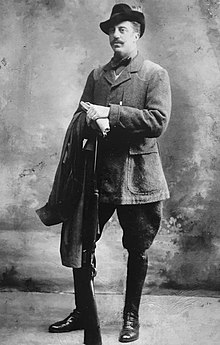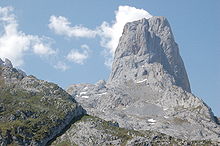Pedro José Pidal y Bernaldo de Quirós
Pedro José Pidal y Bernaldo de Quirós (born November 2, 1869 in Somió , Gijón , † November 17, 1941 in Gijón), Marqués de Villaviciosa, was a Spanish politician . Pidal was a trained lawyer and was also active as a writer and journalist . The silver medal, which he won in the pigeon shooting in 1900 , was considered the first Olympic medal for Spain until 2004. Today, however, the competition is no longer included in the official statistics of the IOC. In 1904 he managed the first ascent of Naranjo de Bulnes . Pedro Pidal campaigned for the establishment of national parks in Spain and thus laid the foundations for nature conservation in Spain .
origin
The Pidal family is an Asturian noble family with ancestral seat in the municipality of Villaviciosa . They have been recorded there since the end of the 15th century. Pedro Pidal's grandfather, Pedro José Pidal y Carniado , held several ministerial offices, was a member of the Real Academia de la Lengua Española and chamberlain to the king. For his services he was awarded the title of Marqués de Villaviciosa . The father, Alejandro Pidal y Mon , was the founder of the political association Unión Católica and president of the Spanish Congress. He was jokingly referred to as the "Tsar of Asturias".
Private life
Pedro Pidal graduated from high school in Madrid at the age of 17. He then studied law at the Universidad Central in Madrid , graduating in 1891. At the age of 22 he married Jacqueline Guilhou, the daughter of a foundry owner and contractor from Mieres . At the wedding, Queen Maria Cristina awarded him the title of Marqués de Villaviciosa . Pedro Pidal and Jacqueline Guilhou had two sons, Alejandro Pidal y Guilhou and Pedro Pidal y Guilhou. As he had wished, Pidal's remains were reburied on September 18, 1949 in the Mirador de Ordiales in the Picos de Europa.
Sports
As part of the 1900 Summer Olympics , Pedro Pidal took part in the pigeon shooting competition. Here he won the silver medal and was therefore for a long time the first medal winner in Spain. However, the International Olympic Committee decided in 2004 not to classify the pigeon shooting of 1900 as an Olympic competition. Formal criteria seem to have been decisive for this, in particular that a cash prize was awarded for winning the pigeon shooting. The IOC no longer lists the medalists from that time among the medalists from Spain . The Spanish Olympic Committee did not agree with the IOC on this issue and continues to lead Pedro Pidal as Olympic champion.
On August 5, 1904, Pedro Pidal, together with the shepherd Gregorio Pérez Demaría, managed the first ascent of the 2,514 meter high Naranjo de Bulnes or Picu Urriellu in the Picos de Europa .
Politics and Conservation
After completing his studies, Pidal devoted himself to politics. From 1896 to 1907 he was a member of parliament for the Belmonte de Miranda district , from 1907 to 1910 for Luarca and since 1899 for Mondoñedo in Galicia . In 1914 Eduardo Dato appointed him senator for life.
As a hunting and nature lover, Pedro Pidal initially showed an interest in reserving certain areas for hunting. During a trip through the USA in 1915 he visited Yellowstone National Park and Yosemite National Park . Inspired by these role models, he campaigned for the establishment of national parks in his home country. Spain passed the Ley de Creación de Parques Nacionales as early as 1916 . Pedro Pidal was elected Comisario General de Parques Nacionales , so he was Vice President of the Junta General de Parques Nacionales . Finally, in 1918, the Parque Nacional de la Montaña de Covadonga (today the Picos de Europa National Park ) was the first national park in Spain to be established. The Parque Nacional del Valle de Ordesa soon followed .
Pedro Pidal's commitment to nature conservation was based less on rational considerations; for him, natural treasures were “sanctuaries” that had to be preserved. The administration of the new national parks turned out to be difficult, especially because the question of land ownership remained open in the National Park Act. In addition, there was poor financial resources and the lack of cooperation between local authorities. New nature reserves were not established in Spain until 1927, after the initiative of geology professor Eduardo Hernández Pacheco introduced other types of protected areas that were better suited to Spanish conditions. Pedro Pidal kept his influence in nature conservation even during the Second Spanish Republic , so he was appointed Presidente-Comisario of the Junta de Parques Nacionales on June 22, 1931 .
Publications
Pedro Pidal wrote regularly for the Madrid newspapers El Imparcial and Vida Nueva . He translated Gorcher's "Teoria de los cambios" and published about twenty books:
- Espiritualismo lógico. (Madrid)
- ¡Alerta, España! (Madrid, 1898)
- ¡Español, edificate! (Madrid)
- Lo que piensa, quiere y puede el extranjero. (Madrid)
- Instrucción pública. (Madrid, 1912)
- ¿Quixotes o Celestinas? Violación de la España naciente. (Madrid, 1916, Collection of Parliamentary Debates on Education Policy)
- Parques Nacionales. (Madrid, Senate debate)
- Lo que es un parque nacional y el parque nacional de Covadonga. (Madrid, 1917)
- Los Picos de Europa. Contribución al estudio de las montañas españolas. (Madrid, 1918)
- El Naranjo de Bulnes, Peña Santa. (Madrid, 1919)
- Política alcance de todos. (Madrid, 1919)
- Filosofía alcance de todos. (Madrid)
- El Crimen político. Fabricando menores y mujeres. (Madrid, 1922)
- Liberalismo dictatorial y despotismo democrático. (Madrid, 1923)
- Constitución católica, apostólica, cristiana. (Madrid, 1927)
- Segundo y simbolo, no sustituto. Apóstol de Cristo, no sacerdote del imperio. Solución al problema religioso político de España. (Madrid, 1930)
- Del paisaje a la politica: Monarquía del “Filioque”, republicana, nacional o de Alfonso XIII. Apertura de las Cortes este verano en al Parque Nacional de la montaña de Covadonga. La Corte en Poo. Las Cortes en Ordiales. (Madrid, 1931)
- El misterio del Uni en el verso explica el universo, determina su filosofia, su religón, su ciencia, su moral y su política. (Madrid, 1933)
- El caso de la Fábrica de Mieres. (Gijón, 1933)
- El caso de los parques nacionales. (Gijón, 1934)
Pidal's literary work was praised by one of his biographers for the "depth of his thoughts, the elegance of the style and his rich and refined education." Another contradicted this view, since he was unable to "penetrate into the secrets of thought that open up there," especially in Pidal's last works.
Honors
For his contribution to the success of the Paris World's Fair in 1900, Pedro Pidal was made a Knight of the Legion of Honor . The Mountaineering Association Peñalara honored him in the summer of 1933 for the first ascent of the Naranjo de Bulnes by building the Mirador del Pozo de la Oración in Poo (Cabrales) . One of the two visitor centers of the Picos de Europa National Park is called "Pedro Pidal".
Individual evidence
- ↑ Garcia Carraffa, A. & A .: Diccionario Heráldico y Genealógico de Apellidos Españoles y Americanos . T. LXIX-LXX, 1953. Copy in Archivo Biográfico de España, Portugal e Ibéroamerica (Nueva Ser.)
- ↑ Francisco Ballesteros: Pioneros de la escalada en roca ( Memento of the original from May 20, 2010 in the Internet Archive ) Info: The archive link was inserted automatically and has not yet been checked. Please check the original and archive link according to the instructions and then remove this notice. . GEO Spain, accessed December 20, 2009
- ↑ a b c d e Constantino Suárez: Escritores y Artistas Asturianos . Volume VI, 1957. Copy in Archivo Biográfico de España, Portugal e Ibéroamerica (Nueva Ser.)
- ↑ El Mundo Deportivo: La medalla 100 es un lío ( Memento of the original dated August 23, 2008 in the Internet Archive ) Info: The archive link was inserted automatically and has not yet been checked. Please check the original and archive link according to the instructions and then remove this notice. , accessed December 20, 2009
- ↑ Fernando Arrechea: No, España no tiene aún 100 medallas olímpicas , accessed December 20, 2009
- ↑ Comité Olímpico Español: Medallas de Plata , accessed January 11, 2018
- ↑ Francisco Ballesteros: La primera ascensión al Naranjo de Bulnes ( Memento of the original of December 24, 2009 in the Internet Archive ) Info: The archive link was automatically inserted and not yet checked. Please check the original and archive link according to the instructions and then remove this notice. . GEO Spain, accessed December 20, 2009
- ↑ Alfonso Mulero Mendigorri: La protección de Espacios Naturales en España . Ediciones Mundi-Prensa, Madrid 2002, ISBN 84-8476-069-3 .
- ↑ Martin Mateos in Biografias asturianas , quoted from Escritores y Artistas Asturianos . Volume VI
- ↑ Ministerio de Agricultura y Pesca, Alimentación y Medio Ambiente: Picos de Europa: Centros de visitantes y otras instalaciones
| personal data | |
|---|---|
| SURNAME | Pidal y Bernaldo de Quirós, Pedro José |
| ALTERNATIVE NAMES | Pidal, Pedro |
| BRIEF DESCRIPTION | Spanish politician, mountaineer and conservationist |
| DATE OF BIRTH | November 2, 1869 |
| PLACE OF BIRTH | Somió , Gijón |
| DATE OF DEATH | November 17, 1941 |
| Place of death | Gijón |

